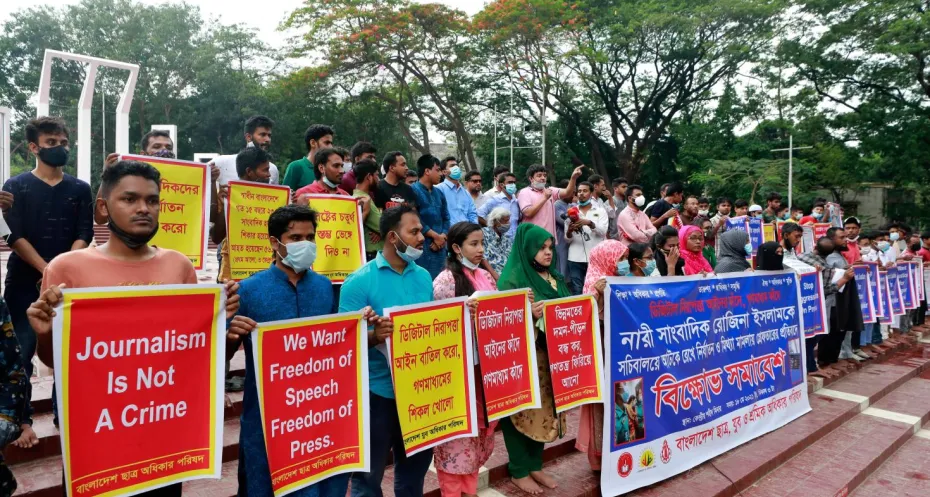
Joining forces for accountability in Bangladesh
Bangladesh is witnessing a dramatic shrinking of civic space. The country’s repressive environment has led to critical information being withheld from the public, threatening the free flow of information and the population’s democratic aspirations. In response to this, Free Press Unlimited and ARTICLE 19 Bangladesh and South Asia have launched the project “Joining Forces: CSOs and Media for Accountability in Bangladesh”.
Journalists in Bangladesh operate in a hostile environment. Attacks on journalists are on the rise, often followed by complete impunity. On 14 June 2023, local journalist Golam Rabbani Nadim was attacked by a group of armed men. On 15 June he died of his injuries in the hospital. He is the second journalist killed in Bangladesh this year, after Ashiqul Islam was stabbed to death on 9 January.
Legal harassment is also a great concern. Through laws such as the Digital Security Act, installed in 2018, authorities have sought to control independent media and human rights defenders that show any public dissent or criticism of the government. In recent years this has only gotten worse. In April 2023, Free Press Unlimited released a statement with ARTICLE 19 and IFEX to express concern about the legal harassment of journalists in Bangladesh, and urge the authorities to take action.
“Joining Forces” strengthens the ability of civil society and media in Bangladesh to engage with each other as actors of good governance and development. We believe that effective collaboration between these sectors is essential to achieve social change and take a stance against legal obstruction. Together, media and civil society organisations (CSOs) can build powerful cases for greater accountability and advocacy. CSOs can share important knowledge, research and expertise with media, and media can generate greater awareness on CSO topics through its publications. This can then engage citizens across geographies and political lines.
Collaboration and capacity-building
The project is divided into two interlinked tracks: one focused on collaboration, and the other on capacity-building. The first track is The Collaboration Lab, a three-year small grants project to foster alliances between Bangladeshi media outlets and CSOs. It promotes collaboration on issues that are important and relevant to Bangladeshi citizens, stimulates the development of innovative solutions by providing financial assistance, and facilitates knowledge exchange and (mutual) learning.
The second track of activities is designed around a comprehensive capacity-building package. Each year, the participators of The Collaboration Lab receive coaching based on their specific needs. The goal here is to improve the level of professionalism, effectiveness and sustainability of their operations, as well as to give them tools to comply with standards of donors, needed to receive and keep funding. On top of this, Free Press Unlimited and ARTICLE 19 are inviting local women’s and inclusion focused organisations and experts to create more awareness around incorporating gender and inclusion in the participant's operations.
Free Press Unlimited and ARTICLE 19 have launched a Call for Proposals for CSO/media alliances in each of the three project years. The third and last Call for Proposals was launched in December 2024.

